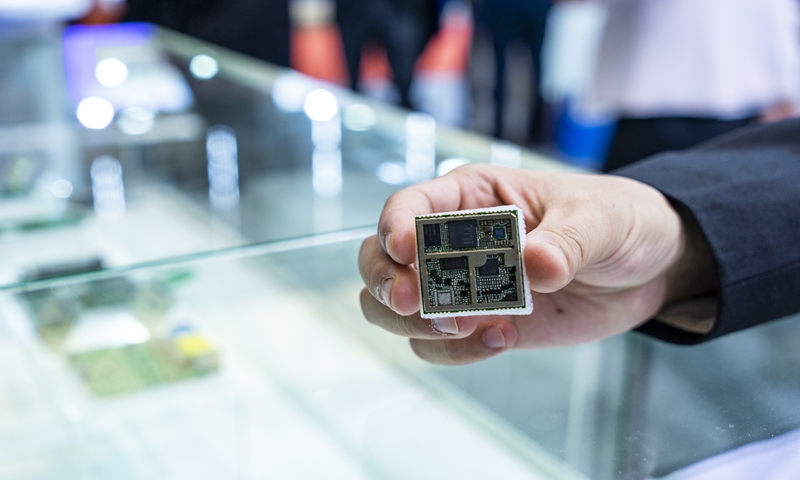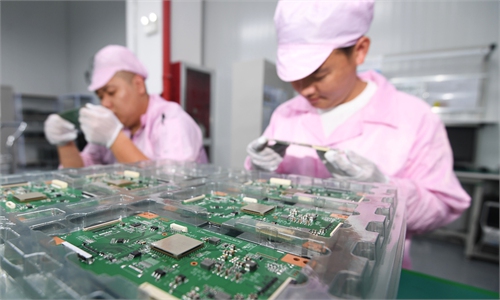
An employee showcases a semiconductor integrated circuit at an industry expo. Photo: VCG
The US took its maneuvers a step further on Friday as the House of Representatives narrowly passed a multibillion-dollar bill aimed at increasing US competitiveness with China and strengthening US semiconductor manufacturing, thus setting up a dispute with the Senate.
The House bill, which could wait weeks or months before being called final amid Senate talks, is an indication that the US is openly showing its China containment stance amid the latter's growing power especially in the high-tech sector, for which China should prepare fully and discreetly, experts said. Meanwhile, the bill won't be a concern to China which is firmly advancing on track to tech self-sufficiency.
The bill started as a bipartisan push to bolster US manufacturing and research, but it has been mired in long-standing partisanship concerning US policy on China. The bill has to pass both chambers before it can be sent to the White House for US President Joe Biden's signature.
The 2,900-page legislation authorizes nearly $300 billion for research and development, including $52 billion to subsidize semiconductor manufacturing and research into the key components used in automobiles and computers. It also has $45 billion over six years to ease supply-chain problems that have exacerbated shortages, Reuters reported. It authorizes $8 billion in US contributions to the Green Climate Fund established by the Paris Agreement to combat climate change and to help developing countries cope.
House Republicans, however, criticized the bill on multiple points, including what they called a "slush fund" for climate programs.
"The bill is not likely to be enacted in its current form given disputes between the House and the Senate. Even if there is almost a consensus on 'targeting China,' some disputes about specific matters still exist," Chen Jing, vice president of the Technology and Strategy Research Institute, told the Global Times on Saturday.
The Senate in June passed its own bill - the 2,376-page United States Innovation and Competition Act (USICA) - by 68-32. The legislation included $52 billion to increase domestic semiconductor production and authorizes $190 billion for US technology and research to compete with China.
When asked for comment on the USICA a day after the bill's Senate passage, Foreign Ministry spokesperson Wang Wenbin said China firmly rejects the bill, which is "filled with Cold War zero-sum mentality."
"How the US intends to develop and strengthen its competitiveness is its own business, but we are firmly against the US making an issue out of China and perceiving it as an imaginary enemy. The US is the greatest threat to itself. Getting its own house in order trumps all else," Wang remarked.
The current anti-China campaign is basically a US self-directed show that will not achieve what it wants; moreover, it might place the interests of US firms in danger given the interwoven cooperation between firms on both sides, Chen noted.
"We have already dropped any illusion about the US since its crackdown on Huawei. Even if there is no such US legislation, we have recognized the reality and started making preparations in case the US makes any other leading Chinese firm its next target," he said.
Global Times


